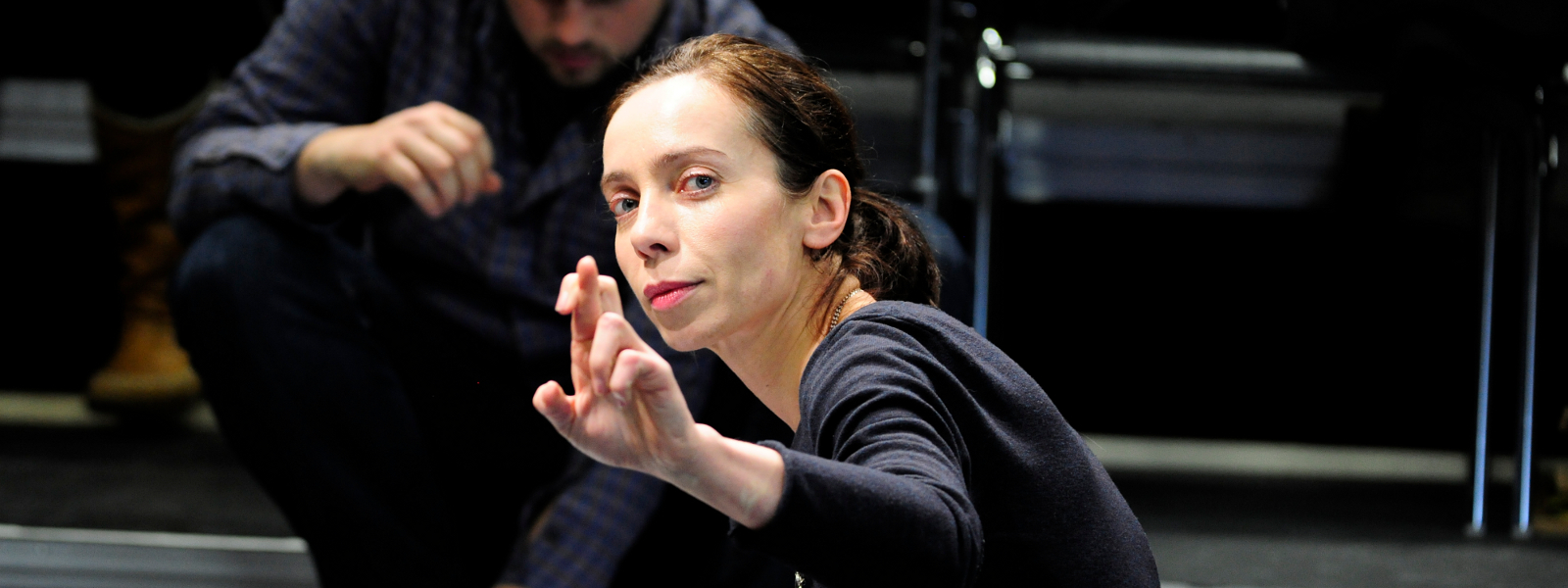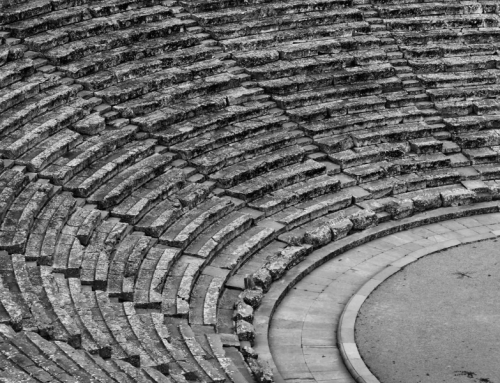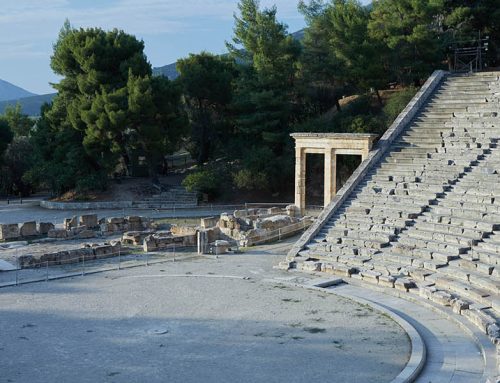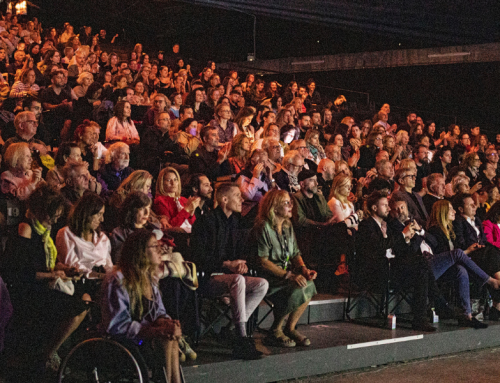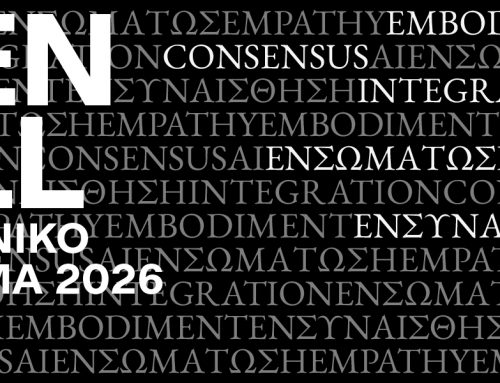Christiane Pohle, the award-winning director and Head of programme at the Academy of Performing Arts Baden-Wuerttemberg, will teach at this year’s Epidaurus Lyceum. Pohle shares her thoughts on directing, her work as stage director and teacher, ancient drama and the important role of an international drama school.
You started your career from acting but since you created the theatre group Laborlavache! in 1999, you started directing. What triggered that change?
Laborlavache! was a vision. A vision of a group of six women developing theatre projects together, independently, every one of us with equal rights and from different angles – from the acting, the directing, or the set and costume designing position. With this project I very organically moved into the position of a directing actress. The whole working process was still reflected in all of us working together. Laborlavache! led us to a very special and beautiful interpretation of Anton Chekhov’s The Three Sisters and when we finished this project, I realized that my very position in theatre from now on would be the one of director. It was very simple and clear, and I never went back to acting. Maybe I realized that I enjoyed having the full picture, so to speak, a more conceptual thinking and working, the idea of influencing the rehearsing process on stage from outside, of empowering the performers from a more distant point of view, of having the chance to develop a bigger, more differentiated picture, or a whole world; to think about rhythm, atmosphere, sceneries, about different and complex layers of texts, stories and characters. I also discovered that I so much love the communication with stage designers, costume designers and dramaturgs, musicians, writers. So that’s where I still am.
As a director, you have collaborated with some of the greatest theatre organizations of central Europe and you have won important prizes (Kurt Hübner prize, Günther-Rühle prize, Encounter Festival prize). What would you say are your main principals when you are directing?
I was very fortunate to work as a director at Schauspielhaus Zürich, when Christoph Marthaler and Stephanie Carp were running this theatre. To be part of this experience was deeply formative and exciting. Later on I met, Ulrich Khuon at Thalia Theater, Joachim Lux at Burgtheater Wien and Frank Baumbauer at Münchner Kammerspiele and learned a lot about the state-subsidized theatre system. Working constantly in the Off-Scene also was and still is part of my work. Going this way I got a very concrete idea that theatre is more than a stage or an “atelier” for different individual artists. It is a living organism, the place of a strong and diverse community of performers, directors, dramaturgs, stage designers, technicians, light designers, musicians, dancers, producers, writers, etc., a place of collective artistic work. Maybe that is why I still see directing as part of a collective journey, inspired by certain subjects/stories/authors/society and initiated by the participating artists. To activate, develop and protect this process are my main tasks as a director. In my experience artistic processes in theatre are deeply connected to long term working relations. I would always try to work with the same partners continuously and in the future maybe found my own international company.
You are a very experienced lecturer for acting and directing. What is it that you enjoy the most when working with theatre students?
I never do ‘classes’. I am rehearsing. And this perfectly works. I may have a small lead in knowledge and experience, and I can help in concerns as far as acting techniques are concerned, but in the very moment of rehearsing and artistic process you always start at the beginning. This ‘beginning’ or ‘point cero’ is frightening, provoking, inspiring all at the same time, and you are never prepared for it. To learn about this as a unique and precious centre of theatre work is what I truly love in my working with students. Another thing I really enjoy is supporting and observing the students development of personality and artistic language, to learn about the point of view of another generation, to meet, confront and connect my own work with the ideas and languages of those, who will create the future theatre.
You will be leading a workshop based on the role of the tragic messenger. What is your relationship with ancient Greek drama?
My first relationship with ancient Greek drama developed out of the question: Why do all those characters and stories still speak to us, and how can this ‘speaking’ be given a contemporary voice and language?
What do you think is the role of an international theatre school? What is the special artistic equipment, it can offer to the participants?
To me, the idea of an international theatre school means to guarantee a safe working space with international classes and workshops as well as independent workspaces. Besides classes with experienced artists and teachers there should be enough room for intense exchange between the students, for developing a creative feedback-culture, for learning from each other, for watching and rehearsing together in order to encounter and practice new techniques and approaches, in order to develop unique and powerful results. In knowing about and appreciating the differences of language, cultural roots and artistic approaches of participants and workshop leaders, an international school could be supporting theatre students from all over the world to meet and to connect. It could empower them to build up their own ideas of working together. And it hopefully could support those, who are interested to initiate international exchange themselves as a needed part of a relevant future theatre work.
A few words about Christiane Pohle
Christiane Pohle was born in 1968 in Berlin and studied acting in Hamburg. In 1999, together with colleagues, she co-founded the company Laborlavache! Since then she has been working as a director for theatre, opera and cross-over projects at Schaubühne Berlin, Sophiensæle Berlin, TIF Dresden, Theater Freiburg, Schauspielhaus Zürich, Salzburger Festspiele, Kampnagel Hamburg, Kammerspiele München, Burgtheater Wien, Schauspielhaus Düsseldorf, Theater Basel, Centraltheater Leipzig, Staatstheater Stuttgart, Staatsoper München, and others.
She received the Impulse-Preis and the Förderpreis für junge Regie der Akademie für Darstellende Künste, the Günther-Rühle-Award for the project Desirevolution, and an award for stage and ensemble at the Encounter Festival Brno for a project on Einar Schleef. She is developing most of her projects together with her dramaturg and artistic partner Malte Ubenauf.
Christiane Pohle is an experienced lecturer for acting and directing, she worked and is still working at UdK Berlin, at the University of Music and Theater Hamburg, at Falckenbergschule Munich, and at the Theaterakademie August Everding Munich. She has been working intensely at ADK Academy of Performing Arts in Ludwigsburg as director of the acting program from 2014-2019. She is leading and directing international students projects and workshops. 2015 she founded the international performance platform hothouse for rough translations [h4rt] together with Malte Ubenauf, Hubert Bauer, Florian Fischer, Benedikt Haubrich and others. Ηothouse for rough translations [h4rt] is the realisation of an interdisciplinary 10-year-project, that started in Munich in an old greenhouse and is supposed to travel in varying sequences through different European countries. Christiane Pohle lives in Munich and Trieste.

Christiane Pohle’s practical workshop at this year’s Epidaurus Lyceum
The tragic messenger
In this workshop participants will look at the messenger as a reporting figure, whose function in the antique drama is to deliver important news, describe past events or events simultaneously happening off-stage or other important actual announcements to the audience and to the characters on stage. Messengers, in most of the cases, are nameless. They themselves normally are not personally participating in the plot’s events. They are not supposed to do so. They are witnesses. Voices. And they accept this because they know the importance of their highly responsible job. They are in a way situated in – between the events, never taking action. Their body and mind are most sensitive as they are responsible for carrying fragile and “explosive” information. The messengers are the message, and their deep need is to deliver it in full complexity.
Each participant will be expected to start a research work as a “messenger” of his/her social, political, historical, and personal context, and to bring an important message to Epidaurus. The message and its emotional impact on the messenger tell us a lot about its dimensions and, maybe, grave circumstances. The group will work on these messages. They will develop text, speech, and nonverbal communication. They will work on characters of different contemporary messengers, on their specific languages and bodies. They will work on scenes about messengers who never stop talking, and others who never talk. They will create and work on theatrical situations, where these actual messengers from all over the world meet, try to understand each other, to listen to each other, to find meaning. Maybe some messengers are not able to deliver, because they have not been heard by any audience until now. Maybe some of them describe big political conflicts; some are reporting very strange and little things. In any case they should bring a contemporary, really important and serious message to Epidaurus, the world should know about. This personal research of each participant is an important preparation for the work.
For more information about the Epidaurus Lyceum programme, please visit the Epidaurus Lyceum page



